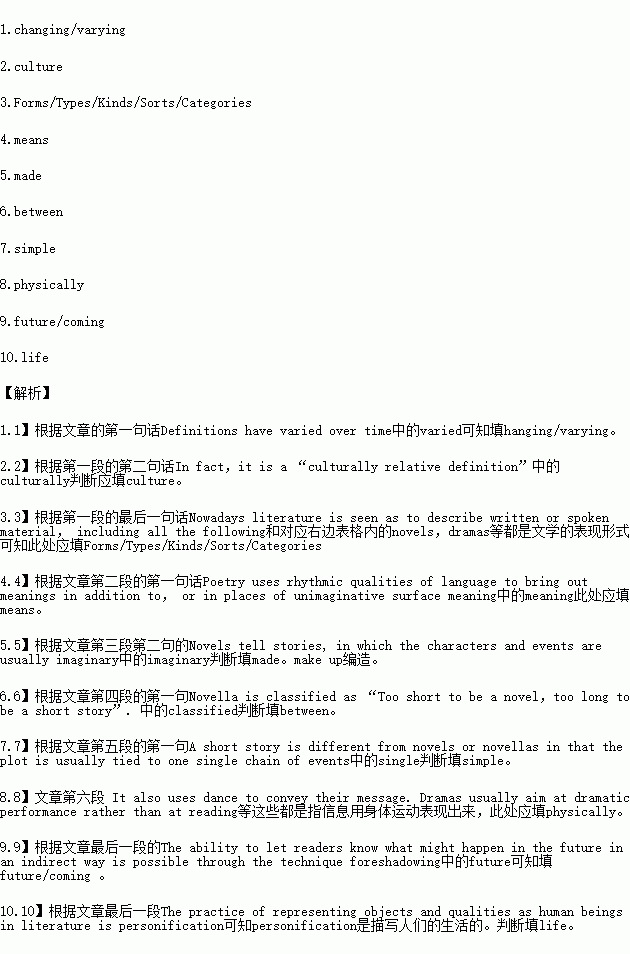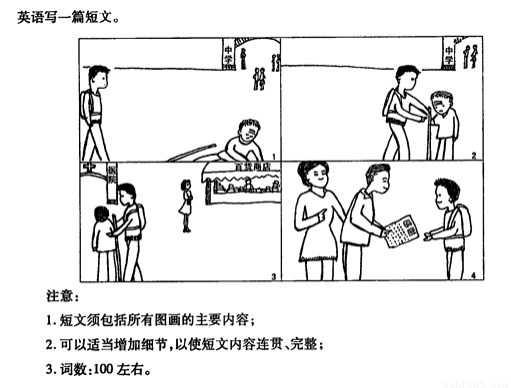题目内容

Novel is typically written in a narrative (叙事) style and presented as a book. Novels tell stories, in which the characters and events are usually imaginary. The novel has been a part of human culture for over a thousand years, although its origins are somewhat debated. Regardless of how it began, the novel has remained one of the most popular and treasured examples of human culture and writing. It remains an essential part of the literary cultures of nearly all societies around the world.
Novella is classified as “Too short to be a novel,too long to be a short story”. There is no precise definition in terms of word or page count. Literary prizes and publishing houses often have their own arbitrary limits, which vary according to their particular intentions.
A short story is different from novels or novellas in that the plot is usually tied to one single chain of events. Because the reader must identify with a character quickly to become engaged, the tale is often told from the chief character’s point of view.
A drama refers to a play for the theatre,television or radio. It generally consists of chiefly dialogue between characters. It also uses dance to convey their message. Dramas usually aim at dramatic performance rather than at reading. In theater, a drama is presented by actors to an audience.
Good literary works depend on literary techniques. A literary technique can be used by authors in order to improve the written framework of a piece of literature, and produce specific effects.
Literary techniques include a wide range of approaches to crafting a work. The ability to let readers know what might happen in the future in an indirect way is possible through the technique foreshadowing. The practice of representing objects and qualities as human beings in literature is personification. Symbolism is the use of symbols to represent ideas.
Literature | |
Definitions of literature | Definitions of literature have kept 1.all the time. |
They are connected with 2. | |
Among them are “books and writing”, “ ‘imaginative’ literature” and “written or spoken material”. | |
3.▲of literature | Poetry, with rhyme, uses unusual word order in lines, which may be a barrier to see what it 4. |
A novel takes the form of a book, talking about what is 5._up by the writer. | |
The novella, as for length, exists 6.the novel and short story. | |
A short story tells a comparatively 7.story compared with novels and novellas. | |
Dramas are performed rather than read, with the ideas expressed either orally or 8.. | |
Literary techniques | Give a warning or sign of a 9.event by using the technique called foreshadowing. |
When personification is used, something without 10.is treated as if it were a human being. | |
Symbolism is the practice of representing things by means of symbols. | |
 孟建平小学滚动测试系列答案
孟建平小学滚动测试系列答案LOST AND FOUND | ROOMATES |
FOUND: Cat, 6 months old, black and white marking. Found near Linden and South U.Steve, 800---4661 | FEMAL ROOMATE WANTED Own room near campus. Available December 1st. Rent $80 per month until March 1st.$129 there after. Call Jill for details,800—7839. |
LOST: Gold wire rim glasses in brown case. Campus area. Reward. Call Gregg 800---2896 | NEED PERSON to assume lease for own bedroom in apt. near campus, $92/mo. Starting Jan. 1st. Call 800---6157 after 5:00 |
FOR SAIL | HELP WANTED |
MOVING: Must sell. TV b/w2 seconds, $50; AM/FM transistor radio A/c or battery, $15;cassette tape recorder,$10; music records. Call John or Pat, 800—0739 after 5 or weekends. | BABYSITTER-MY HOME If you are available a few hours during the day, some evenings and occasional weekends to care for 2 school-age children, please call Gayle Moore days 800—1111, evenings and weekends 800—4964. |
USED FUR COATS and JACKETS GOOD CONDITION. $50---¥125. Call 800---0436 after 12 noon. | WAITRESS WANTED: 10 a.m.—2 p.m. or 10:30 a.m.---5 p.m. Apply in person, 207 s. Mai. Curtis Restaurant. |
1. If you want a job of taking care of children, which ad will you answer?
A.LOST AND FOUND B. ROOMMATES C. FOR SAIL D.HELP WANTED
2.You will call____ if you want to buy a radio.
A. 800---0436 B. 800—0739 C.800—4661 D.800—4964
3. If your aunt wants to rent a room from Feb.1st to Apri.1st, how much money should she pay?
A. $160 B. $ 129 C. $ 209 D. $418


